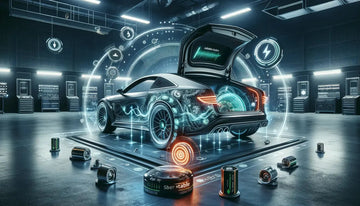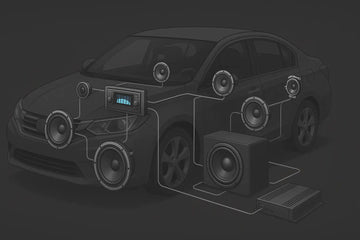Car Audio Capacitor: Complete Guide to Power Stabilization & Sound Enhancement
Transform your car audio system with professional-grade capacitor technology. Discover how car audio capacitors eliminate voltage drops, enhance bass response, and protect your electrical system while delivering consistent power to high-performance amplifiers.
A car audio capacitor serves as your system's electrical insurance policy - storing energy during low-demand periods and releasing it instantly when your amplifiers need maximum power. This comprehensive guide reveals everything you need to know about selecting, installing, and optimizing capacitors for superior audio performance.
Understanding Car Audio Capacitors: The Science Behind Superior Sound
 Modern car audio systems demand more power than ever before, placing significant strain on your vehicle's electrical infrastructure. A **car audio capacitor** addresses this challenge by functioning as an electrical energy reservoir that stabilizes voltage fluctuations and ensures consistent power delivery to your amplifiers.
The Critical Role of Electrical Stability in Audio Performance
Your vehicle's alternator and battery provide steady power under normal conditions, but high-powered audio systems create sudden, intense power demands that can overwhelm the electrical system. During bass-heavy passages or high-volume listening, amplifiers draw massive amounts of current in milliseconds, causing voltage drops that manifest as:
Voltage Depression Symptoms
Dimming headlights, dashboard flickering, and reduced amplifier output during musical peaks
Audio Distortion Issues
Clipping, compression, and loss of dynamic range when amplifiers lack sufficient clean power
System Protection Concerns
Premature component failure due to inconsistent power supply and electrical stress
Performance Limitations
Inability to achieve maximum system potential due to electrical system constraints
Do I Need a Capacitor for My Car Audio System?
Whether or not you need a capacitor for your car audio system depends on the power requirements of your audio equipment. If you have a high-powered audio system and experience voltage drops or dimming headlights, a capacitor can help stabilize the electrical system and provide a consistent power supply. By providing energy storage and voltage regulation, capacitors protect other electrical components in the car audio system, such as amplifiers and speakers, from voltage fluctuations, spikes, and voltage drops. This protection helps prolong the lifespan of audio equipment, prevent system failures, and safeguard against audio distortion, ensuring high-quality sound output.
How Car Audio Capacitors Work: Energy Storage and Release Mechanics
A **car audio capacitor** operates on fundamental electrical principles, consisting of two conductive plates separated by a dielectric material. When connected to your electrical system, the capacitor charges during periods of low power demand and discharges rapidly when your amplifiers require additional current.
Capacitor Operation Cycle
- Charging Phase: During quiet musical passages, the capacitor draws current from the alternator/battery system, storing electrical energy
- Standby State: The fully charged capacitor maintains voltage potential, ready for immediate discharge
- Discharge Phase: When amplifiers demand high current, the capacitor releases stored energy instantaneously - **Capacitors act as energy storage devices**, providing a reserve of power from which the audio system can draw when necessary
- Recovery Cycle: The capacitor rapidly recharges between power demands, maintaining system stability
Types of Car Audio Capacitors: Choosing the Right Technology
 Different capacitor technologies offer varying benefits depending on your system requirements, installation constraints, and performance expectations.
Traditional Electrolytic Capacitors
Standard electrolytic capacitors remain the most common choice for car audio applications, offering reliable performance at reasonable cost. These capacitors use aluminum electrolytic construction with liquid or solid electrolytes, providing good energy density and discharge characteristics for most installations. Audio devices, such as car amplifiers, demand high energy, so capacitors provide instantaneous energy to meet these demands without straining the electrical system.
Electrolytic Capacitor Advantages
- Cost Effectiveness: Proven technology at accessible price points for budget-conscious installations
- Wide Availability: Extensive selection of capacitance values and voltage ratings
- Reliable Performance: Decades of field-proven operation in automotive environments
- Simple Installation: Straightforward wiring requirements with standard terminals
Hybrid Capacitor Technology
**Hybrid car audio capacitors** combine multiple energy storage technologies to optimize both rapid discharge capability and long-term energy storage. With hybrid capacitors, car audio enthusiasts can experience improved bass performance, making them ideal for elevating their audio experience with authoritative yet approachable power. These advanced systems typically integrate electrolytic capacitors with supercapacitor technology, delivering superior performance for demanding applications. Hybrid capacitors optimize electrical energy storage by combining different energy storage technologies and delivering enhanced bass response without straining the system.
Hybrid Technology Benefits
Hybrid capacitors provide the best of both worlds: the high-energy density of electrolytic capacitors combined with the rapid charge/discharge cycles of supercapacitors. This combination results in more consistent power delivery and improved bass response, particularly beneficial for competition-level systems.
Digital Display Capacitors
Modern car audio capacitors with digital voltage displays provide real-time monitoring of system performance, allowing you to observe voltage fluctuations and verify proper operation. Digital capacitors with voltage displays offer real-time monitoring, optimizing audio performance by preventing system fluctuations and ensuring stable and regulated power for car audio systems. These units typically feature LED or LCD displays showing current voltage levels and charge status.
Car Audio Capacitor Sizing: The Complete Guide
Proper capacitor sizing ensures optimal performance without oversizing your system or wasting money on unnecessary capacity. The relationship between amplifier power and required capacitance follows established guidelines refined through decades of car audio engineering.
The Industry Standard: 1 Farad Per 1000 Watts Rule
The foundational rule for car audio capacitor sizing specifies 1 Farad of capacitance for every 1000 watts RMS of total system power. This guideline provides adequate energy storage for most applications while maintaining cost-effectiveness.
Capacitor Sizing Calculator
| Total System Power (RMS) | Minimum Capacitance Required | Recommended Capacitance | Maximum Benefit Range |
|---|---|---|---|
| 500W - 1000W | 1 Farad | 1-2 Farad | Excellent |
| 1000W - 2000W | 2 Farad | 2-3 Farad | Optimal |
| 2000W - 3000W | 3 Farad | 3-5 Farad | Professional |
| 3000W - 5000W | 5 Farad | 5-10 Farad | Competition |
| 5000W+ | 10+ Farad | Multiple Units | Extreme SPL |
Advanced Sizing Considerations
While the 1000W/1F rule provides a starting point, several factors influence optimal car audio capacitor sizing:
Musical Content Analysis
Bass-heavy genres require larger capacitance values due to sustained low-frequency power demands
Electrical System Health
Older vehicles or those with charging system issues benefit from increased capacitance
Installation Distance
Longer wire runs between battery and amplifiers justify larger capacitor values
Usage Patterns
Competition systems and sustained high-volume listening require oversized capacitors
Top Car Audio Capacitors: Professional Reviews and Recommendations
Our comprehensive testing and analysis reveal the leading **car audio capacitor** models that deliver exceptional performance across different price points and applications.
Review: Rockville RFC50F v2 50 Farad Car Audio Capacitor

Extreme High-Capacity Performance
If you want to enhance your car audio system with a reliable high-capacity car audio capacitor, the Rockville RFC50F v2 is worth considering. Offering 50 farad capacitance and enhanced bass response, this capacitor is designed to support high-output setups.
- 50 Farad massive energy storage capacity
- Digital voltage display with blue LED illumination
- Professional-grade spade terminals
- Supports systems up to 50,000W RMS
- Heavy-duty aluminum construction
Advantages:
- Exceptional power storage capability
- Competition-grade performance
- Real-time voltage monitoring
- Professional installation ready
Considerations:
- Premium investment required
- Large physical dimensions
It efficiently stabilizes voltage and stores energy with features like spade terminals, a digital display, and Farad energy storage. User reviews attest to its reliability and effectiveness, making it suitable for car audio enthusiasts seeking optimal performance.
View Professional CapacitorsReview: Stinger SSCap2M Brushed Aluminum 2 Farad Capacitor

Premium Mid-Range Performance
The Stinger SSCap2M boasts a sleek brushed aluminum design and a 2 farad capacitance, coupled with a high discharge rate. Its compact size and spade terminals make it versatile for different audio setups.
- 2 Farad optimal capacity for most systems
- Brushed aluminum aesthetic finish
- High discharge rate capability
- Compact footprint design
- Professional spade terminal connections
Advantages:
- Excellent price-to-performance ratio
- Premium build quality
- Versatile installation options
- Reliable long-term operation
Considerations:
- No digital display
- Limited to moderate power systems
Its energy storage capabilities, capacity to handle voltage fluctuations, and support for high wattage demands ensure enhanced bass and power for your car speakers. User reviews, installation flexibility, and performance indicators are crucial in assessing the overall value of this capacitor.
Review: NVX XCAP1F True 1.0 Farad 20V Capacitor

Entry-Level Professional Choice
The NVX XCAP1F impresses with its authentic 1.0-farad capacitance and 20V maximum power, delivering enhanced bass for car audio systems. Its farad digital features, spade terminals, and energy storage make it an excellent fit for high-output audio systems.
- True 1.0 Farad verified capacitance
- 20V maximum operating voltage
- Digital display with charge indicator
- Compact installation footprint
- High-quality construction standards
Advantages:
- Honest capacity rating
- Affordable entry point
- Digital monitoring included
- Proven reliability record
Considerations:
- Limited to smaller systems
- Basic feature set
The compact size, voltage stabilization, discharge efficiency, and compatibility with various audio setups add to its appeal. User feedback on installation ease and performance at high amperage is positive, making the NVX XCAP1F a reliable choice for impressive power storage capabilities.
Car Audio Capacitor Installation: Professional Techniques
Proper installation ensures your audio capacitor delivers maximum performance while maintaining electrical safety and system reliability.
Pre-Installation Planning and Safety
Before beginning installation, comprehensive planning prevents common issues and ensures optimal performance from your capacitor investment.
Critical Safety Requirements
Always disconnect the vehicle's negative battery terminal before beginning any electrical work. Car audio capacitors store significant electrical energy and can cause injury or equipment damage if mishandled. Never work on a charged capacitor without proper discharge procedures.
Professional Installation Process
- System Assessment: Evaluate total amplifier power requirements and select appropriate capacitor size according to the 1000W/1F guideline
- Location Selection: Choose mounting location near amplifiers but away from heat sources, ensuring adequate ventilation and secure mounting
- Power Wire Routing: Install appropriately sized power wire from battery positive terminal to capacitor, including proper fuse protection
- Ground Connection: Establish solid ground connection using same gauge wire as power connection, ensuring clean metal-to-metal contact
- Capacitor Charging: Safely charge capacitor using resistor method or built-in charging circuit before connecting to amplifiers
- System Integration: Connect capacitor output to amplifier distribution block or individual amplifier power terminals
- Testing and Verification: Test system operation and monitor voltage stability under various load conditions
Common Installation Mistakes to Avoid
Undersized Power Wire
Using inadequate wire gauge creates bottleneck that negates capacitor benefits
Poor Ground Connections
Weak ground connections cause voltage fluctuations and reduce capacitor effectiveness
Improper Fuse Rating
Incorrect fuse values create safety hazards or limit system performance
Inadequate Mounting
Loose mounting allows vibration damage and potential electrical disconnection
Car Audio Capacitor vs. Alternative Solutions
Understanding when capacitors provide optimal solutions versus alternative approaches helps you make informed decisions for your specific system requirements.
When to Choose Each Solution
Car Audio Capacitor Ideal Scenarios
- Dynamic Music Systems: Rock, electronic, and bass-heavy genres with sudden power demands
- Competition Applications: SPL competitions requiring maximum instantaneous power delivery
- Budget-Conscious Upgrades: Cost-effective performance improvement for moderate systems
- Space-Limited Installations: Compact solutions where second battery won't fit
- Electrical System Support: Vehicles with adequate charging systems needing peak power support
Debunking Car Audio Capacitor Myths
Several misconceptions surround audio capacitors, leading to confusion about their proper application and benefits.Myth vs. Reality: Setting the Record Straight
Myth: "Capacitors Don't Work - They're Snake Oil"
Reality: Quality capacitors provide measurable benefits when properly sized and installed. Oscilloscope testing demonstrates reduced voltage fluctuations and improved amplifier performance during dynamic musical passages.
Myth: "Bigger is Always Better"
Reality: Oversized capacitors provide diminishing returns and may cause charging system stress. Follow the 1000W/1F rule with consideration for specific system requirements.
Myth: "Capacitors Replace Battery Upgrades"
Reality: Capacitors complement rather than replace proper electrical system upgrades. Severely deficient charging systems require alternator or battery upgrades first.
Myth: "All Capacitors Are the Same"
Reality: Construction quality, internal resistance, and discharge characteristics vary significantly between manufacturers and price points.
Maximizing Car Audio Capacitor Performance
Optimizing capacitor performance requires attention to installation details, system integration, and ongoing maintenance practices.Performance Optimization Techniques
Professional Performance Tips
Position your **car audio capacitor** as close as possible to your amplifiers while maintaining safe mounting. Shorter wire runs reduce resistance and improve discharge efficiency. Use high-quality terminals and connections to minimize voltage drop and ensure reliable operation.
System Integration Best Practices
Wire Management
Use appropriate gauge wire throughout the power distribution system to prevent bottlenecks
Connection Quality
Ensure all connections are clean, tight, and protected from corrosion
Thermal Considerations
Provide adequate ventilation and avoid heat sources that affect capacitor performance
Regular Monitoring
Check voltage readings and connection integrity during routine system maintenance
Troubleshooting Car Audio Capacitor Issues
Understanding common problems and their solutions ensures reliable long-term performance from your capacitor investment.Diagnostic Procedures
Common Issues and Solutions
- Slow Charging: Check power wire connections and fuse integrity
- Rapid Discharge: Verify capacitor internal condition and load connections
- Voltage Instability: Inspect ground connections and wire gauge adequacy
- Display Malfunction: Test voltage at terminals to verify actual capacitor condition
- Physical Damage: Replace immediately if case damage or electrolyte leakage occurs
Future of Car Audio Capacitor Technology
Emerging technologies continue advancing car audio capacitor performance, efficiency, and integration capabilities.Next-Generation Developments
Technological Advances
- Supercapacitor Integration: Hybrid designs combining traditional and supercapacitor technologies
- Smart Monitoring Systems: Bluetooth connectivity and smartphone app integration
- Advanced Materials: Graphene and carbon nanotube applications for improved performance
- Integrated Solutions: Capacitors built into amplifier designs for optimal performance
Complete Your Audio System Enhancement
Transform your entire vehicle audio experience with professional-grade components designed to work harmoniously with your car audio capacitor.High-Performance Amplifiers
Professional amplifiers engineered to maximize capacitor benefits and deliver exceptional sound quality
Shop AmplifiersPremium Car Speakers
High-efficiency speakers that complement your enhanced power delivery system
View SpeakersProfessional Installation Accessories
High-quality wiring, fuses, and installation components for optimal system performance
Shop AccessoriesSubwoofer Systems
Powered subwoofers that benefit most from stable capacitor-enhanced power delivery
View SubwoofersFrequently Asked Questions About Car Audio Capacitors
A 1000W RMS system benefits from a 1-2 Farad capacitor, especially if you experience dimming lights or voltage fluctuations during loud passages. The capacitor will provide instantaneous power delivery and stabilize your electrical system.
A functioning capacitor should charge to approximately your vehicle's charging voltage (13.8-14.4V) and maintain voltage during musical peaks. Digital display models show real-time voltage, while performance improvements include reduced light dimming and cleaner bass response.
Properly installed capacitors protect your electrical system by reducing load on the alternator and battery. However, incorrect installation or oversized units can stress the charging system. Follow manufacturer guidelines and proper installation procedures.
If your charging system cannot maintain proper voltage under load, upgrade the alternator first. Capacitors work best when the charging system can maintain adequate baseline power. A weak alternator cannot effectively charge a large capacitor.
Quality capacitors typically last 5-10 years with proper installation and maintenance. Factors affecting lifespan include operating temperature, charge/discharge cycles, and construction quality. Premium units often include warranties reflecting their expected longevity. Whether you're looking for an amp kit, amp, or watt and volt efficiency, these capacitors are suitable for cars, motorcycles, ATVs, and more.
Yes, a 1000W RMS amplifier will benefit significantly from a 1-2 Farad capacitor. This sizing follows the industry standard of 1 Farad per 1000 watts and will provide noticeable improvements in bass response and voltage stability, especially during dynamic musical passages.
A capacitor in your car's sound system doesn't directly modify the audio signal itself. Instead, it plays a crucial role in maintaining a stable and consistent power supply to your audio components, especially during peak power demands. By doing so, it indirectly influences the audio signal quality. When your audio system demands high power, especially during deep bass hits or loud passages in music, a capacitor can quickly provide the necessary power, preventing voltage drops. Such voltage drops can lead to distortion or clipping in the audio signal, negatively affecting sound quality. Therefore, by ensuring the electrical system's stability, a capacitor helps maintain the integrity and clarity of the audio signal, providing a cleaner, more robust sound output.
Transform Your Audio Experience with Professional Capacitor Solutions
A car audio capacitor represents one of the most cost-effective upgrades for improving system performance, reducing electrical stress, and enhancing sound quality. By understanding proper sizing, installation, and integration techniques, you can achieve professional-level results that transform your daily driving experience.Experience the Audio Intensity Advantage
Discover why thousands of audio enthusiasts trust Audio Intensity for their car audio enhancement needs. Our expert-selected capacitor solutions combine proven performance with exceptional value, backed by professional installation support and comprehensive technical guidance.
Shop Professional Capacitors Explore Audio IntensityWhy Choose Audio Intensity for Your Car Audio Capacitor
- Technical Expertise: Professional guidance for proper capacitor selection and system integration
- Quality Assurance: Only proven, high-performance capacitors that deliver measurable benefits
- Installation Support: Comprehensive resources and professional installer network
- System Compatibility: Expert matching of capacitors with amplifiers and electrical systems
- Performance Guarantee: Confidence in our capacitor selections backed by customer satisfaction
Additionally, incorporating a capacitor into your car's audio system can significantly enhance your listening experience. Whether you seek improved sound quality, enhanced bass response, or optimal performance, a capacitor is a valuable investment. By understanding the basics of capacitors and choosing the right one for your needs, you can maximize the potential of your car audio system.
The Impact of Capacitors on Sound Quality
Enhancing the sound quality of your car's audio system is crucial for an immersive listening experience. Car audio capacitors are pivotal in maintaining voltages, preventing distortion at high wattage levels, and ensuring enough power to minimize alternator load. By reducing voltage drops during high power demand, capacitors improve stereo sound quality and enhance amplifier performance for high-quality sound output. Their capacitance also minimizes power supply limitations, resulting in distortion-free, high-wattage output, making your music experience truly remarkable.





